Developing ‘Black Panther: Wakanda Forever’ in the Cloud
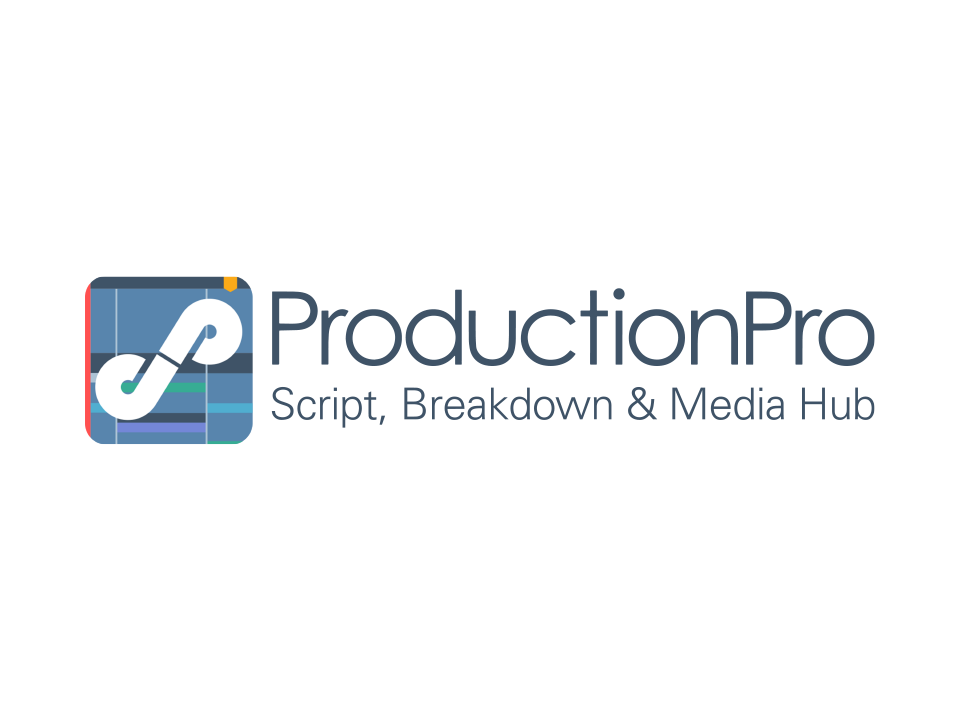

184
Characters
322
Scenes
113
Sets
12
Production Departments Collaborating Daily
10
Official Script Revisions During Production
372
Storyboards, pre-vis videos, concept art and other references attached to the script breakdown
Summary
Coordinating hundreds of people and thousands of assets, amid a constant stream of creative changes, is a daunting undertaking during the script-to-camera phase of a production. Traditionally managed with email, shared files, mark-ups, printed documents and hand annotations, the process was ripe for a “2030 Upgrade” to centralize the pre-production assets within a ‘single source of truth’ system that coordinates activities and assets across multiple production departments.
The ProductionPro SaaS platform used on Marvel Studios’ Black Panther: Wakanda Forever production demonstrates core elements of the MovieLabs 2030 Vision by deploying a cloud-based production management system that enables real-time collaboration for all participants in a secure way. ProductionPro’s singular script, breakdown and media hub uses the structure of the story to organize information in a visual way that everyone understands. By interlacing the work of all departments and connecting it to the current script, it provides a bird’s-eye-view of the entire production and enables the whole creative team to stay in sync. As the script iterates through multiple different versions, the underlying data structures evolve with the changes in the story, allowing every participant (with their respective notes and edits) to keep up with all the latest changes.
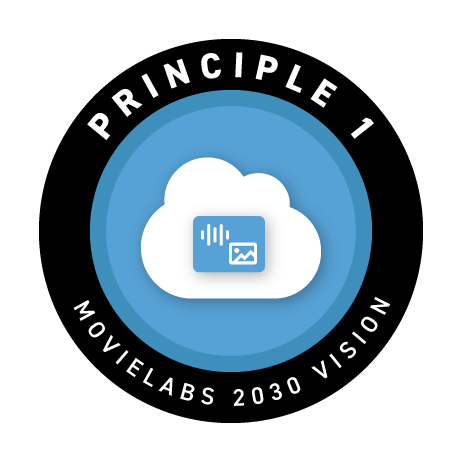
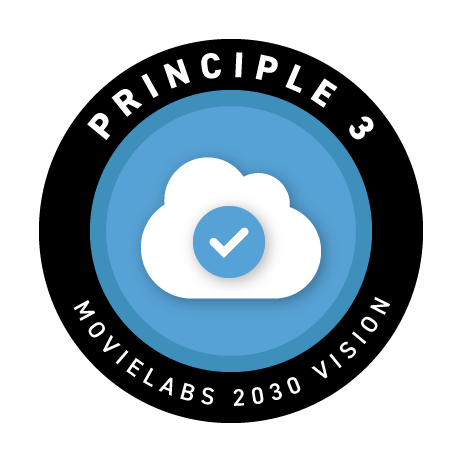
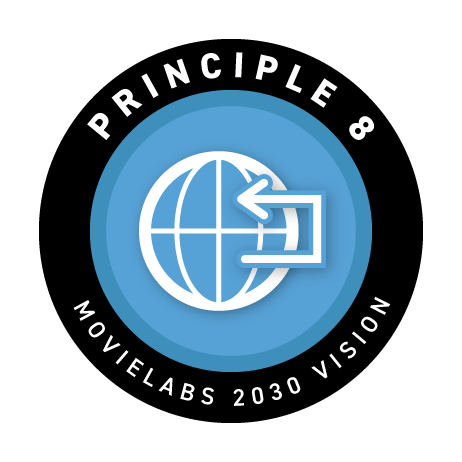
Background
Productions are a giant exercise in project and change management. During pre-production, hundreds of people spread across a dozen departments are working to prep all the elements for two hundred-plus scenes that morph daily, all using unique tools to exchange huge amounts of complex and sensitive data. Yet traditionally they lacked a connected system to share, review and track that data in real-time.
While industries across the board have embraced cloud-based efficiency-driven processes, the entertainment industry has been patching together ill-adapted technology, often from other industries (asset managers with rigid folder structures, scheduling applications that output PDFs, spreadsheets shared via email, photo sharing apps retrofitted for location scouting, etc.), crippling creative collaboration and hindering the security of assets. Current workflows rely heavily on coordinators and asynchronous transfers, often manual, to get material and feedback to the right people at the right time – all of which introduces delay and the potential for data loss, confusion, and miscommunication.
Information is a key currency on a film production. Pinpointing critical information from different departments is often an anxiety-inducing but vital endeavor for the creative team as information shifts rapidly throughout prep and production. In every department, creatives are going through a similar exercise in parallel, breaking down the script on their own, managing their own asset organization system and wasting precious time sifting through emails, links and storage systems to find the puzzle pieces they need from others. Once they are done, they often have to start all over again, as the production continues to evolve and the all-too-familiar is-this-the-latest guessing game continues.
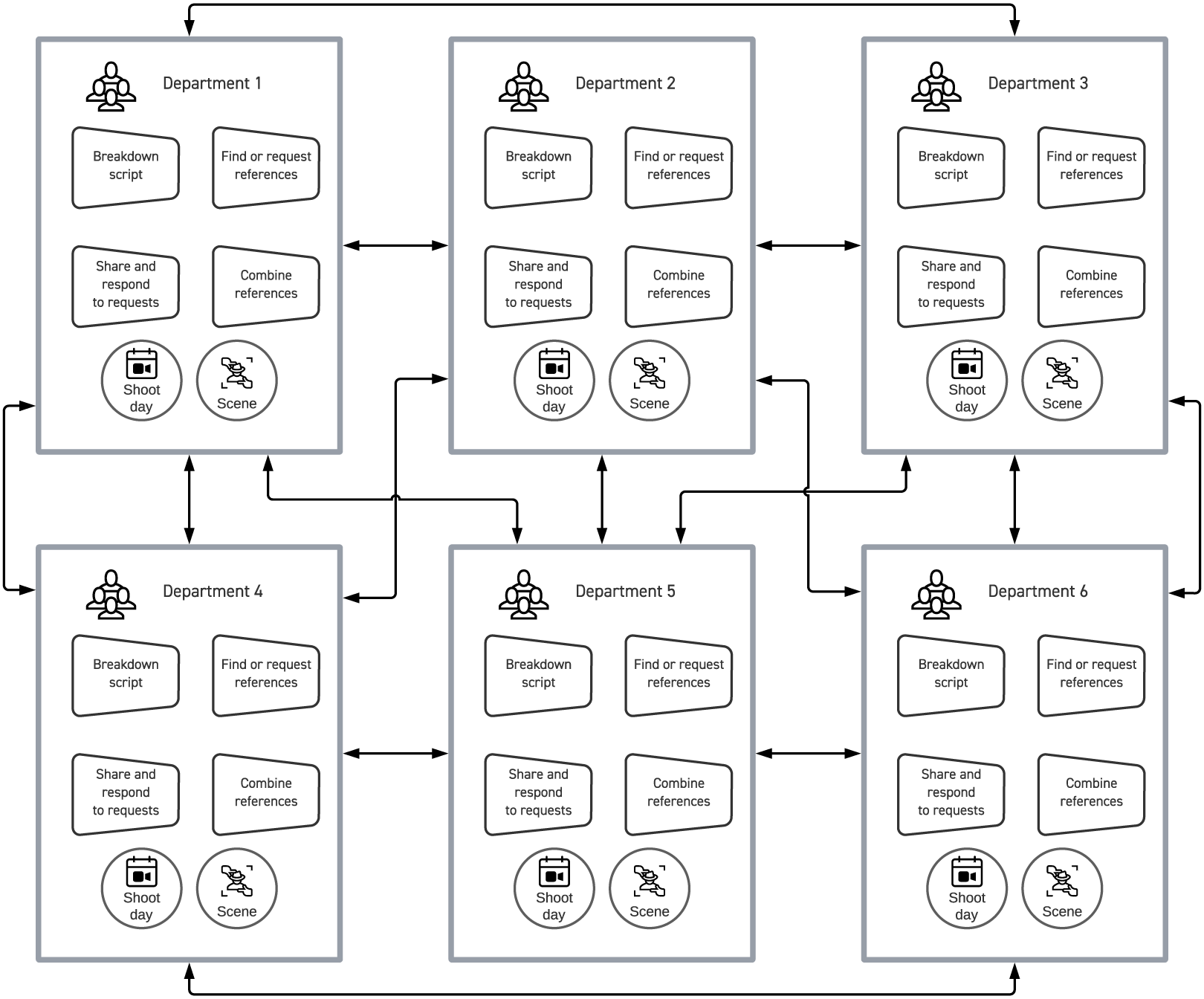
Figure 1: Different production departments each run their own script breakdowns and manage their own assets, passing messages between themselves to coordinate the information
Solution
On Black Panther: Wakanda Forever, ProductionPro provided the creative team with a real-time, cloud-based virtual space where they could view approved creative assets – such as previz, concept art and costume sketches – assembled and contextualized within the applicable section of the script.
As a critical shared resource, the script is uploaded once to the system and clearly marked as “current” (with prior versions automatically archived). ProductionPro uses a Natural Language Processing algorithm to generate a script breakdown and extract core components, such as scenes and characters, which, when combined with other production elements, such as departments, build the backbone of the production’s unique organizational system.
Team members use the script as a collaborative canvas within the ProductionPro apps, adding personal or shared notes using annotation layers. Most importantly, the script breakdown provides the basis of a universal organization system that is unique to the production, yet intuitive to all. That system interlaces the work of all departments and connects them to the script, providing a bird’s-eye-view of the entire production enabling fast and shared access to material to keep the whole team in sync.
Architecture
The system is operated as a SaaS application hosted by ProductionPro on the AWS cloud. Media assets, either generated or uploaded to the app, are immediately sent to ProductionPro’s cloud-based storage. Users, or the system itself, add tags to those media assets, such as predefined tags (like character or scene), or department specific tags. Those tags add to the assets’ existing metadata to build relationships between them and enable users to filter, group or find media in the way that makes the most sense to them and the way they work. The work of multiple departments can effectively be combined in one place, giving anyone on the production team a holistic view of the production, together with the ability to drill down into specifics from each department.
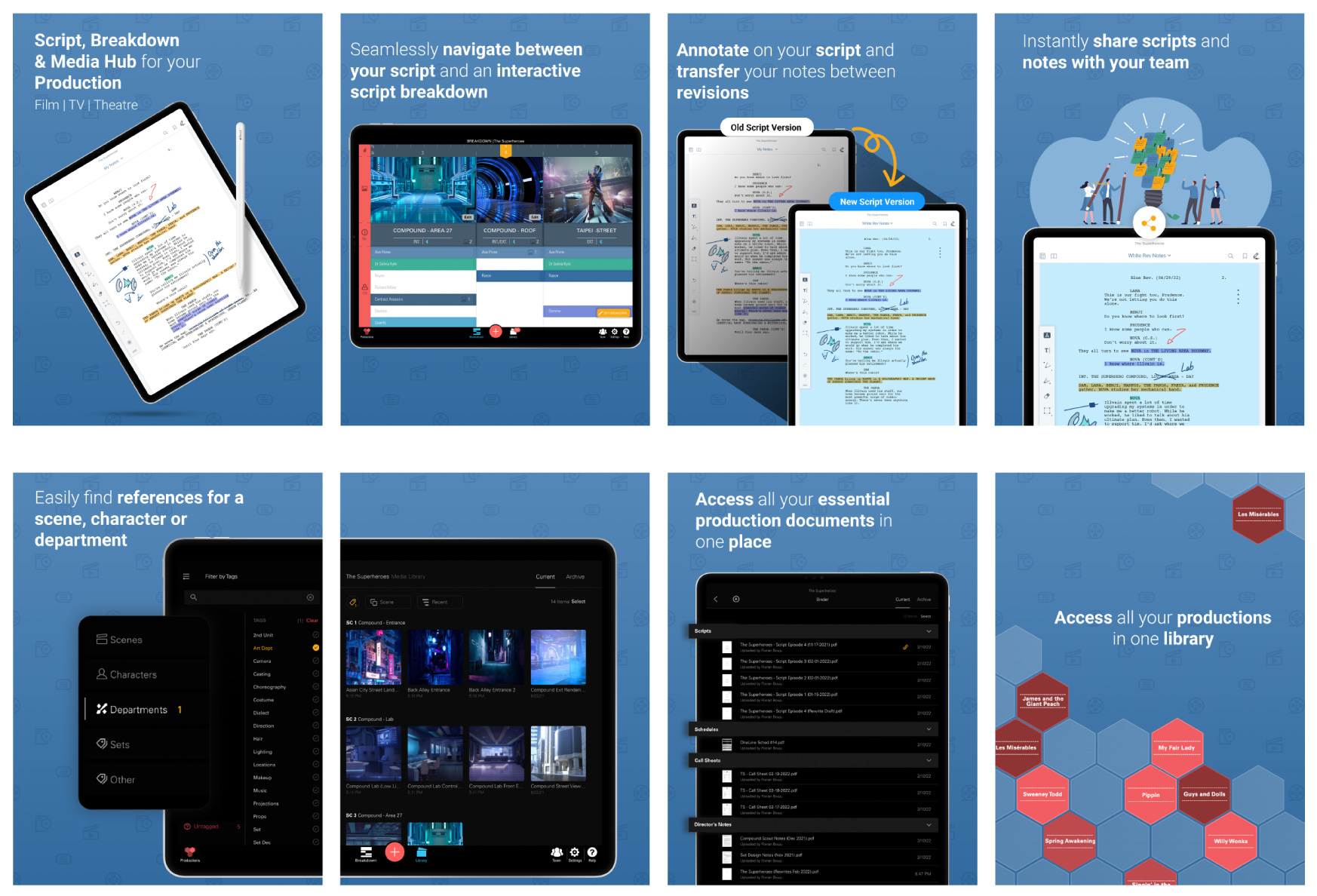
Figure 2: Screenshots from the ProductionPro app show how assets are contextualized within a clickable script-breakdown and the metadata that links media elements together can be used to navigate between them
The script is connected to pre-production media assets to enable users to seamlessly navigate between a given script page and the corresponding media references. It also serves as a collaborative canvas via the use of shared script notes. When the script gets revised, the breakdown and connections are updated, so the system remains up-to-date with ‘living’ documents.
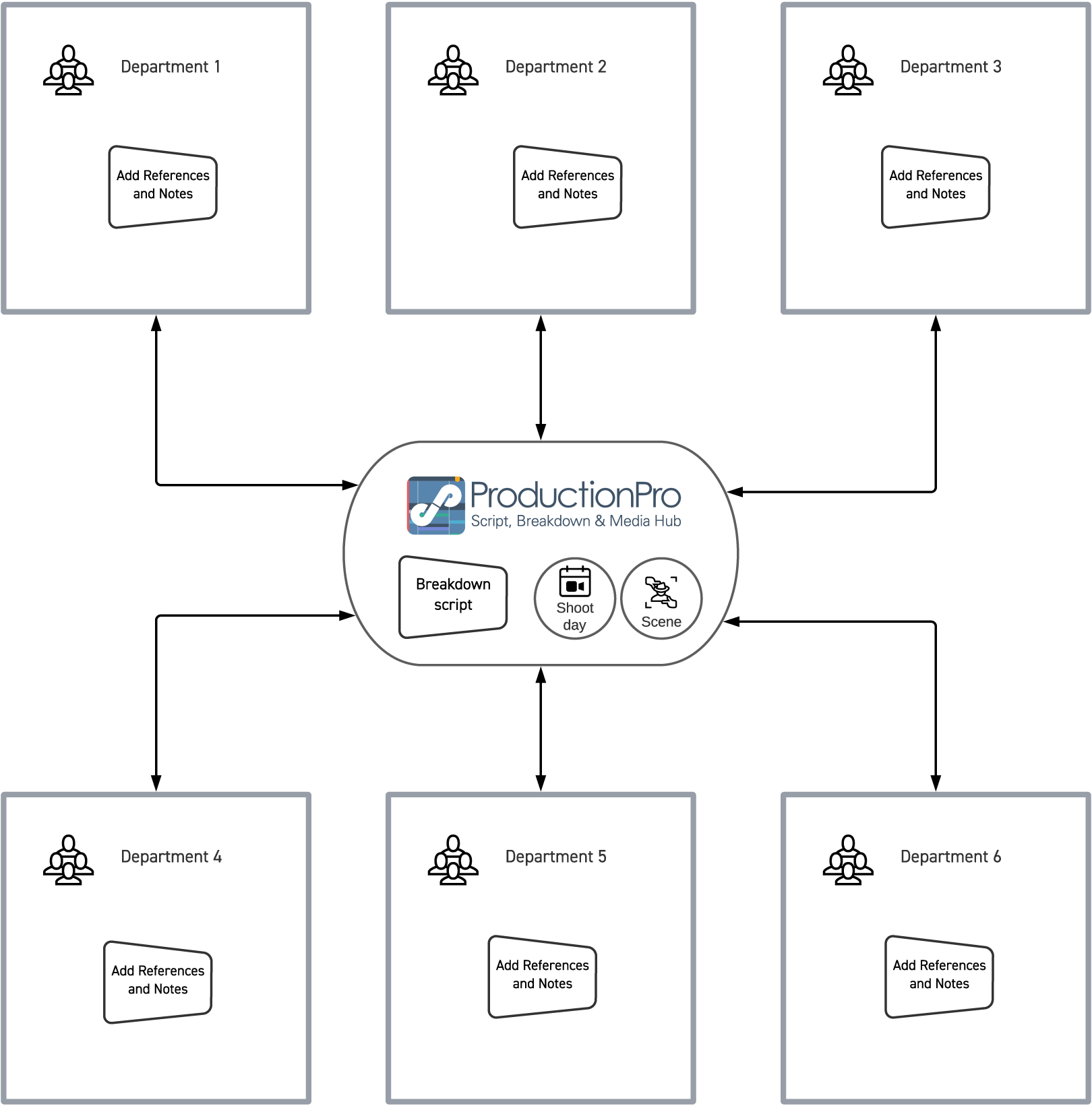
Figure 3: With the ProductionPro platform in place, communication between departments is centralized and the volume of duplicative tasks is reduced
BENEFITS
ProductionPro users appreciate that it uses the structure of the story as a universal canvas to organize and contextualize production information in one place: no two people think alike, but in ProductionPro, everyone can find what they need, when they need it.
By breaking down communication silos between departments, ProductionPro saves time and brain space for everyone. Files uploaded to ProductionPro are accessed and viewed without needing to be downloaded on a device or in personal storage. The system allows changes to flow smoothly within the creative team so that everyone stays on the same page working on the shared vision. If the system saves 10 minutes a day for each user who spends less time searching for answers or materials from other departments, that savings adds up to more than 1000 hours saved, more than 42 working days, for even a modest 50-crew, 6-month-long production.
Alignment with MovieLabs 2030 Vision Principles
This use case demonstrates the following 2030 Vision Principles:
PRINCIPLE 1
In ProductionPro’s cloud-native application, assets from multiple departments (concept art, plans, research, storyboards, pre-viz, etc.) are immediately sent to the cloud to form a shared single-source-of-truth for the entire production.

PRINCIPLE 3
An asset, such as the script, is stored once in the cloud for all to use as a shared resource, with individual contributions layered on top of it (e.g., personal or shared script notes). Changes are propagated in real-time, with notification of changes published to all users with access to the shared cloud repository. By sharing with access and notifications, rather than copying and sending duplicates, the system ensures that all participants are operating on the same assets and version control is strictly supported – critical during creative iteration processes in pre-production.

PRINCIPLE 8
ProductionPro uses the structure of the story to create an organizational system universally understood, where individual media elements are linked together using metadata. The system can automatically tag different types of assets (e.g., wardrobe sketches, scene designs, storyboards, etc.) with organizational references that connect it to the relevant portion of the script. References tie the asset to scenes, characters, departments, etc., and even if the script is modified or updated, references retain the links to the narrative elements.

Partners
The idea for ProductionPro was born on a film set in 2010, when founder Alexander Libby, then working as executive assistant to Oscar-nominated and Emmy-winning director Stephen Daldry, realized that it was a daily struggle for people to find what they needed from each department and get an up-to-date overview of the production. Since then, the close relationship that the company has built with feature film and episodic creatives has made it possible to build a system that production users are enthusiastic about and that can break down silos between production departments.
Productions from the Walt Disney Studios, and Marvel Studios in particular, have been early product adopters. The Walt Disney Studio Technology team has been a strong supporter, helping ProductionPro navigate its benchmark-setting security standards, as well as internally advocating for the product’s adoption.
Lessons Learned
There is a general appetite for better, more streamlined collaboration at the production level. However, as one-off projects with squeezed budgets and schedules, individual productions have lower incentive to be the standard-bearers of change. Content owners have an essential role to play in supporting longer term innovation and accelerating adoption of new solutions.
Typically, production departments only have time to focus on solutions for their immediate needs, and it’s been historically hard to implement new software that connects the work of multiple departments to streamline communication. ProductionPro has demonstrated that it’s no longer impossible and it’s highly beneficial to bring a coordinated approach.
NEXT STEPS
ProductionPro is transitioning from a role-based access control (RBAC) to an attribute-based access control (ABAC) model in the coming months – which will provide the ability to assign permissions more granularly, based on a user’s department, role, and access tier.
ProductionPro’s vision is to build an ecosystem around the core structured data that can be derived from the script. Ultimately this will mean opening ProductionPro to 3rd-party integrations, via a public API, with systems that will both contribute and ingest production data while ProductionPro combines and contextualizes that data into one single source of truth.
An important area of growth for the product revolves around change management, so that human input is both minimized and crowdsourced. For example, building a true Production Version Control System for the structured script data, as well as providing means for users to contribute in a mutually beneficial way to reduce duplicate and repetitive work.
In addition, ProductionPro plans to augment features for access control and permissions so that a studio’s identity management system controls granting (or revoking) general access to an application, while a production admin controls permission levels within the application and access within a specific production.
MOVIELABS PERSPECTIVE
The 2030 Vision is often discussed in relation to media capture and post processes, but it was designed to equally apply from concept and greenlight all the way through pre-production, physical production and post. The ProductionPro Showcase demonstrates that software systems can dramatically improve team collaboration and coordination by applying the 2030 Vision principles during the very earliest stages of story innovation and development. The cloud-first ‘single source of truth’ for pre-production assets removes confusion around version control and simplifies workflows while both improving security and allowing all departments to benefit from a shared canvas. This case study also demonstrates the benefits of standardizing around a common data format that unifies all connected applications. We look forward to seeing how such pre-production management systems can connect to the other areas of production and align common data so that it continues to flow to later processes in video capture and on through distribution and even to the archive.
Get the Case Study
Download a free PDF of this case study
